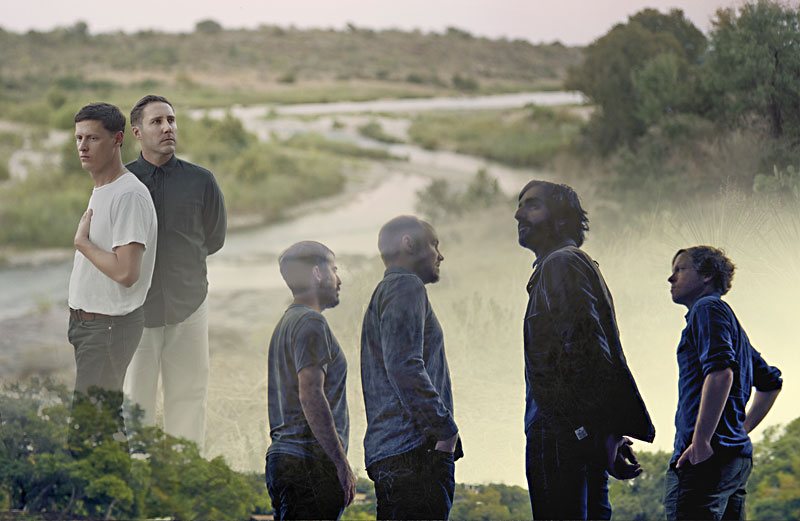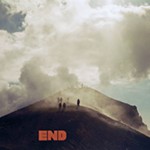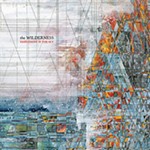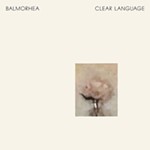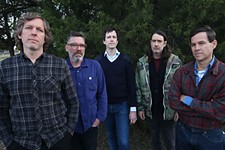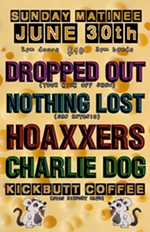Space and Distance: A Joint Interview With Balmorhea and Explosions in the Sky
How Austin’s landmark instrumental outfits soundtrack the state of Texas
By Austin Powell, Fri., Dec. 10, 2021
Chris Hrasky wishes there was a better backstory to Big Bend (An Original Soundtrack for Public Television), Explosions in the Sky's first new album in five years. A grueling hike on the South Rim Trail. A moment of clarity crossing the Rio Grande. A fleeting glimpse of the Pallid bat, stalking its prey under the stars. Something. Anything.
"There was no grand pilgrimage," Hrasky laments during an hour-long Zoom, his fraying beard marking the months of the pandemic. "That would've been awesome, but we're scattered across the map."
Explosions in the Sky – Hrasky on drums, guitarists Munaf Rayani and Mark Smith, bassist/guitarist Michael James – relied instead on their own vivid memories of Big Bend and the remarkable footage captured for the episode of PBS's longrunning Nature series that premiered in February. (Read our 2011 cover story with EITS for more.)
EITS is inextricably linked to West Texas. The band wrote 2003 landmark The Earth Is Not a Cold Dead Place hunkered down in Midland – where all but Hrasky originally hail from – and drew inspiration from the nearby Monahans Sandhills State Park. Their subsequent soundtrack for the film adaptation of Friday Night Lights captured the high-stakes drama and romanticism of small-town Texas football – and catapulted the group to national acclaim.
Big Bend operates on a different scale. The album's 20 compositions, extended from specific scenes in the documentary, piece together aspects of Texas' last frontier – the weathered cliffs, volcanic peaks, and staggering canyons – and score the remarkable rituals of the wild creatures that roam there. From the plight of the acorn woodpecker (which trust me, you really need to see) to the flight of Anna's hummingbirds, Explosions in the Sky captures what makes this National Park such a treasure.
To celebrate the release of the album, Hrasky sat down for a long conversation with Rob Lowe, co-founder of Balmorhea, another serenely dramatic Austin-based instrumental band whose deep catalog is imbued with Texas' natural beauty. The group's latest, The Wind, recorded at Nil Frahm's Funkhaus Saal 3 studio in Berlin and released in April on Germany's prestigious Deutsche Grammophon, offers an exercise in deep listening, contemplating the effects of climate change with understated sophistication and grace.
Hrasky and Lowe shared their thoughts on West Texas, breaking out of post-rock, and soundtracking these strange times.
Austin Chronicle: The Big Bend soundtrack strikes me as more of a personal project, something that hits close to home. How did it come to be?
Chris Hrasky: They contact us – I can't discern the movement of time anymore – definitely pre-pandemic, and we went out to lunch with the filmmakers and talked about it. We were just wrapping up touring and thought it would be an interesting thing to do. It seemed like a nice, low-stakes project to work on. It wasn't a Ken Burns documentary or anything [laughs]. It was just an hour-long episode of Nature, the PBS show. The guy who was the cinematographer of the episode lives in Austin and is a fan of the band. We just thought it would make sense.
We sent demos to each other over a year, a couple of years. I don't know how long it was. We finished it about a year ago, but it's just seeing the light of day now.
AC: What did the band do to prepare for the soundtrack? Did you spend any time out there together?
CH: No. That would've been awesome, but we're scattered across the map. Mike [James] is in Los Angeles these days, Munaf [Rayani] is in Detroit, Mark [Smith] and I are in Austin. There's kids, and we had just finished two years of touring.
We started just sending stuff back and forth. There was no real timeline or pressure. Honestly, we looked at it as a way to start working on some new stuff. We tend to write a record, record it, release it, and then tour it for a couple of years, and in that time, we don't write music at all. We're not good at that sort of thing. We're slow.
Eventually, last summer, for about three months, we really focused on it and finished it up last fall. There was no grand pilgrimage out to Big Bend. We've spent a lot of time out in West Texas, for sure. The other three dudes are obviously from Midland.
Rob Lowe: Which is also where I'm from, coincidentally. It's a strange place to share in that way.
CH: And I lived in Midland for about six months in 2002. We all left Austin and moved to Midland because we could live really cheaply, and we got this practice space that we could go to in the basement of some downtown building that we could go to from 9 at night until 6 in the morning, if we wanted to. That's mostly where we wrote The Earth Is Not a Cold Dead Place.
RL: I would've been a junior in high school. I would've been dumbfounded to know that was happening there. I graduated in 2003 and moved to Austin. That's probably when I actually heard Explosions in the Sky.
CH: We were in these apartments right behind Albertsons, next to this decrepit old movie theater.
RL: That's probably the most heat musically Midland has ever felt, those six months.
CH: On my own, I've gone to Big Bend, and we have some friends in Terlingua, which is weird to have more than one, because there are so few people there.
AC: It's my understanding that in that Midland phase you also spent a lot of time out at Monahans [Sandhills State Park] and took some inspiration from that experience.
CH: We did. I had never been out there. I grew up outside of Chicago. We'd go out there every once in a while, late at night. We had this giant boombox, and we'd play back recordings we did or just listen to records lying out there. It was like being on another planet. We don't do stuff like that anymore because we're all old. But I do miss some of that, "Let's go out to the desert and listen to music." We probably should.
AC: We would all benefit from that.
RL: It's kind of a function of growing up out there. Any small town would be similar. There's not a lot to do so you just find yourself creating your own situations. I didn't have any shows to go to. There wasn't a scene at all.
CH: What high school did you go to?
RL: I went to Lee High School for my freshman and sophomore years, and then I transferred to a private school, Trinity, for my junior and senior years. But I grew up in public schools, so I really understand and relate to the football side of things, though I hated that world when I lived there.
CH: So did those guys.
AC: That's quite ironic.
CH: It is. I mean, we're all sports fans, but they were going to school with these guys, and they're not the nicest dudes in the world.
RL: And at that age, you're building your world. If you're into music, or I was into theater, that becomes diametrically opposed to football. You have to choose one.
CH: The battle lines are drawn pretty clearly.
RL: It is ironic. You guys basically created the sound of football.
CH: It's still a weird thing for us. We did the soundtrack to the movie 17 years ago, and there are people who tell us how much they love the Friday Night Lights soundtrack and tell us it's the best thing we've ever done. It's not. But we're thankful for it. It helped us a lot.
AC: Reflecting on Big Bend – the landscape, the scale of it all, and the soundtrack – do you feel a connection between Explosions in the Sky and West Texas?
CH: I'm the drummer, so I'm really reacting to the melodies that they're writing, and I can feel it filtered through their experiences, just growing up weirdos in Midland. But there's nothing specific about it to me. It's not the sound of West Texas. To me, this music sounds like Northern Illinois, because that's where I grew up, and that weird loneliness is everywhere, whether it's in the desert or the suburbs of Chicago.
It's weird. We came up with a lot of ideas, but we didn't score it until the end, really the last couple of weeks. It ended up being about two weeks of crazy amounts of editing. They didn't have a music editor or anything. We were just editing things to the scenes. In the past, the movies have had music editors, and we'd just give them the stuff and they'd figure out how to place it properly. I don't think that answered the question at all.
AC: I think it speaks to an element of both Explosions and Balmorhea. There are specific places and scenes that have become associated with the music, but it's still really open and personal.
CH: Being instrumental certainly lends itself to that. But I don't think of our music as the sound of West Texas. And when I listen to [Balmorhea], I don't get that sense. It makes sense that you're on [German record label] Deutsche Grammophon. It fits into that world. It feels bigger to me than West Texas.
RL: With instrumental music, you're often trying to express stuff without language, sometimes simple emotions, sometimes complex, sometimes any number of things that could be interpreted differently by different people. But I think a lot of times it's easier to assign meaning through a place – a sense of what a desert evokes, or for us, it's often the ocean – than it is to get in and talk about what this music is making us feel emotionally in this moment.
AC: That said, Rob, as I was watching the documentary, I was reminded of was that [William B. DeWees] quote [from Letters From an Early Settler of Texas to a Friend] that's on the inside cover of All Is Wild, All Is Silent: "I have never witnessed a sight of the kind, which, in my opinion, was more beautiful than this. The color of it is far deeper and richer than any I have ever before seen. ... Yet we are in a country with which we are entirely unacquainted; no road, no compass, and at the point of starvation." That record really seemed grounded in a sense of place.
RL: I think that's why I think we found meaning in that particular journal at that time. This experience that you often get with a place, and it doesn't have to be in a desert or a national park – it could be in your neighborhood or wherever – but in a lot of ways I think that what we do correlates to those types of experience that have a sense of awe. It felt like a good analogy for us to use that quote for that record and those writings as a parallel for the types of ideas we were exploring.

CH: When I think about the stuff we did for Big Bend, a lot of it fits the movie well, but there's a lot of playfulness to it, much more so than what we typically do. I love Big Bend, but it's a very intimidating place – not just because it's out in the wilderness. It's not the Smoky Mountains or Yellowstone. It's harsh. It's an intimidating, inhospitable place. It's humbling to be out there. You don't matter. This place will kill you if it needs to. I don't know if the soundtrack reflects that very well.
RL: The thing with Big Bend is you need to just pick one thing and stick to it. It's too big. There's too much to try to accomplish more than one hike in a day. You just need to settle into one thing. It's one of my favorite places. I went there a lot as a kid and still go frequently, but it is a little intimidating.
CH: It offers a stark reminder: We don't matter. You go to Yellowstone and there's gift shops everywhere and bad traffic. You go to Big Bend, it's the least-visited national park [in the lower 48], which makes sense, because the closest airport is El Paso, four hours away. There's something about the isolation there that I find really attractive and terrifying. I fantasize that I could go live out there, but I don't think I actually could. I think I would go crazy.
RL: It's been really important for us to try to get outside of our home and try to spend time in similar remote places when we're trying to write music. Just for us focus-wise, that gets harder and harder the older we get.
CH: That's totally what we want to do, but like I said, we're scattered. Now it's about trying to cram in as much as we can when we can. We meet up every few weeks these days, usually here in Austin to work on stuff. But the idea of us going somewhere open-ended to work on stuff, it's just difficult.
RL: It becomes a party of 20 or whatever.
CH: It just doesn't seem possible for us right now. Maybe in 20 years, but who knows what we'll be doing in 20 years. It's just what happens. We started the band when we were young. Other things come into your life. We have to figure out a way to get out into the middle of nowhere for a while. That would be ideal.
AC: I'm glad you mentioned the playfulness. There's a difference between what you hear in the movie and what's on the soundtrack. It's much lighter, almost whimsical at times on the screen.
CH: That's true. The soundtrack feels very different.
AC: I loved that, actually. You can't have that dark, desolate sound if it's a scene of a beaver's grooming ritual.
CH: They had sent us clips, so we knew there was a lot of funny footage of goats playing and things of that nature. There's a lot we left off the soundtrack because it was way too playful. It sounded like cartoon music. It worked for the scene, but not really for us.
RL: Did you guys have fun with that? Did it come easily?
CH: Almost too easily. Here's this cute, little funny sound. Put that in. It was easy, but it's not what we necessarily wanted to present on the record.
AC: From my perspective, there was a struggle for a while to figure out how to sound like Explosions without sounding like Explosions, how to keep moving forward. The soundtrack seems like a good vehicle for that.
CH: It's interesting because I feel the soundtrack is really streamlined, and there's some bright stuff on it. But then the stuff we've been working on the last few months is sprawling and fairly unpleasant, which is a new realm for us. We've had stuff that's heavy, but the new stuff kinda makes me feel unsettled, which is clearly a reflection on how everyone is feeling these days.
The problem with us is that anytime there's time off between projects, it's like, "What are we doing? How did we write songs in the past?" There seems to be no map or path for us. I don't mean that in a cool, we-just-go-with-it way. It's like, literally, how do people write songs? It's very difficult, and it takes us a while.
RL: I feel the same way. It doesn't get easier.
CH: If anything it's gotten harder. We used to be way more prolific. Obviously circumstances change, but you also just become so critical. It takes way longer for us to write music than it used to.
AC: For you, Rob, with each new release, Balmorhea seems very intentional about turning a new page. Can you tell me about the inspiration for The Wind?
RL: We recorded it in Germany in October of 2019, and finished mixing and tracking in December, so it was right before the pandemic. It really feels like a different world, a different era to look back on. For us, we had closed a certain chapter with Clear Language. We viewed that as a set in a way. We didn't have any obligation to a record label. We didn't have a sense of where we wanted to take it, except that we wanted to take it back to the roots of the beginning – not necessarily in terms of the music but how we went about writing it. Mike [Muller] and I wanted to spend a lot more time in a room together just trying to write songs that work with just a piano and a guitar. Let's see if we can get the core of these songs to work in a real place instead of getting into the studio and layering.
We recorded the album in Germany and just working in that studio was really incredible and had such a strong sense of place. It's a studio called Saal 3 out of Funkhaus. It's a historical studio, and that added a lot to the sound, but it was really about Mike and I trying to write and connect in a way we hadn't in a few years.
AC: Going back to those early days of Balmorhea, you started in the shadow of Explosions in the Sky. Even if you could avoid their influence, the comparisons were inescapable. How did that impact your approach?
RL: You guys were such a huge inspiration. Mike and I were talking this morning, and we both have such a vivid memory of seeing you guys at The Parish. It must've been 2004. The energy that we got from that show, and a time when Mike and I were just starting to become friends. You guys were a huge influence and helped us commit to what we wanted to do, even though I think musically it was quite different.
CH: It's a totally different thing, to my ears at least.
RL: Yeah, but being in this city, at that time, writing instrumental music, it was inescapable, in the best possible way. I would venture to guess, for the majority of our career, if we went to an interview that didn't mention Explosions in the Sky, that would be in the 2% rare category.
CH: For us, if the term post-rock was not used, it's like it didn't happen.
RL: People are always looking for those categories. That's just how life is. Honestly, our music is not very easily classified. So I think "post-rock" helped us find an audience early on that has become maybe less relevant now. You're always going to push against whatever category or box people put you in, but as a much smaller band, we felt grateful just to be included in the community.
AC: Can you both just bring me up to speed on what you've been working on lately and how you're staying connected?
CH: We've been meeting up in Austin every six weeks or so, and we'll all be here for four or five days. And in that time, we'll spend all day, all night working on stuff and recording demos. In the interim, when we're apart, we're emailing recordings back and forth and snippets of ideas. "We can build this the next time we see each other," or, "We can focus on this for a few days." It's pretty regimented. You just have to adapt to life and family. It's just how it goes.
RL: Mike moved to LA just about a year ago, during the pandemic, and at the start of it, we didn't get together at all. But to the extent that it's been possible, when we weren't going through a crazy surge or having a baby, in my case, we've been getting together throughout this year. We're well on our way to our next record, but it's a weird time to be an artist. How do you know what you want to present? There's a lot that I've written that just feels like it doesn't fit anymore.
The whole world feels so pressurized. Music is such a release for both of us and a way to focus on intangible things and not have to look at all of the insanity that's in front of us, but it can be difficult to see what to present at a time like this, and it gets harder when you have a wave that keeps you apart for two months. It's challenging, but it's been challenging for everyone in the whole world. Some certainly more than others.
Chris, there are times when Mike and I are just not inspired. It's hard to write right now.
CH: Yeah. We have a ton of stuff, snippets of things here and there. We've finished two songs over the course of a few months, but sometimes you're working on things, and it's like you're doing it just for proof you've been doing something. Romantically, you'd like to think that these difficult times in the world will fuel you to create these great works, but I don't know. I have a very easy life, and I'm just exhausted. It's about trying to channel that anxiety into something productive, and that's difficult – not just with what's happening now but the encroachment of everything else that's coming. It can sap your energy.
RL: I was listening to this podcast with Jeff Tweedy the other day and he was talking about how part of his job is to protect his inspiration, and how difficult that can be as an artist. I found that to be very true of this moment in particular for myself – looking for that thing that propels you to create and contribute. It's a hard time to find that, when we're all stuck in our houses and contracted in a lot of ways. But I also know that when I look back on my own history of doing this kind of work, I'm always the most confused right before something comes into focus.
CH: It's that battle. You're in these weird depths that you feel like you're never going to get out of, and then you do, and everything snaps into focus a bit more. It's definitely weird. There's part of me, and I have to try to subdue it, but part of me that just thinks: Who cares anymore? That's an awful feeling, but you just have to push back on it. That feeling, of being doomed, washes over me a lot, but this is just the situation we're in right now. You have to try to contribute in some way or put some order to things.
RL: It's really easy to lose the sightline of why music matters when you're faced with real crisis. I have to remind myself very regularly that in the hardest moments of my life, music has been one of the only things that's a very tangible lifeline. I've been going back and listening to some very uncool things from my childhood. Everyone finds that comfort in their own way. In some ways, art or music, from my point of view over these last 18 months, is one of the things that grounds me.
I read this book a couple of years ago by Lewis Hyde called The Gift. It's a fantastic book about art. To reduce the idea of the book, he talked about art in its truest form operates mostly as a gift. I think there's a lot of things that go along with that, but when I look at my life and my own experiences, I feel that to be true. It can be difficult to remind yourself that you're part of this gift economy. To whatever extent you have any control or sense about who else out in the world might receive your gift, but I know I'm part of that chain, and that it's a gift to me too to be able to contribute. It's important to try to hold onto that, your part in this larger web of feelings and music and ideas that's being exchanged.
CH: The temptation to take that for granted is always present, but I get to make music with my best friends. This is my life.
RL: It's not just that, Chris. The music you've made has touched people in a very real way. It may be hyperbole to say you've saved some people's lives, and maybe it is in some ways, but music I do think has the power to really affect people that way.
CH: I can think of that only in the most abstract terms sometimes, like, "Oh yeah, people actually listen to this music." It doesn't really occur to me. I know that's the case. I know when we put something out, people are listening to it, but it doesn't really occur to me.
RL: Live shows are the easiest way to get that exchange, and we've all been deprived of that for so long. That's a bunch of people agreeing to come together in a place to share an experience. And when that gets taken away, it gets even more difficult.
CH: We haven't played since February 2020. We got home and two weeks later the world shut down. That's the longest we've ever gone as a band without playing live. It's just weird.
Balmorhea celebrates the release of The Wind at the Paramount Theatre on Friday, Dec. 17. Marisa Anderson & William Tyler open.
Balmorhea’s Michael A. Muller Reviews the New Explosions in the Sky
Big Bend (An Original Soundtrack for Public Television)
By Michael A. Muller
My first exposure to Explosions in the Sky was in 2001, shortly after their debut album, How Strange, Innocence, was released. For a photo-journalism class, I chose "live music" as my final project and, coincidentally, saw a show listing for EITS at Emo's soon thereafter. Just before their set began, I climbed onto the side edge of the dirty, thinly carpeted stage where I watched and photographed a wordless masterpiece in what would be the first of many performances of theirs I would witness over the years. Two plus decades later, EITS relegates their prescribed quiet-loud-quiet adage for broader, sensorial motifs in the original soundtrack for Big Bend: The Wild Frontier of Texas, which premiered this fall on PBS. Amid the hour-long journey, spacious percussion, acoustic guitars, subdued strings and sparse electronic elements ripple through the canyons and bluffs. A lighter, sweeter air surrounds this music. These are intimate motets that feel familiar yet hazy, like a half-forgotten dream. The music is encompassing – as rich and complex as the wide landscape it's in concert with here. With the bulk of the score hopeful and less intense than their earlier studio work, EITS still softly punches the emotional buttons they know best: simple, repeated melodies that imbue some nostalgic triumph with a brushstroke of solemnity. On my last listen through the final piece, "Human History," I close my eyes as spectral echoes gently slap off of the cliff face. The darkening stormhead forming above the mesa glows at the edges from the bright Texas sun just behind it.





